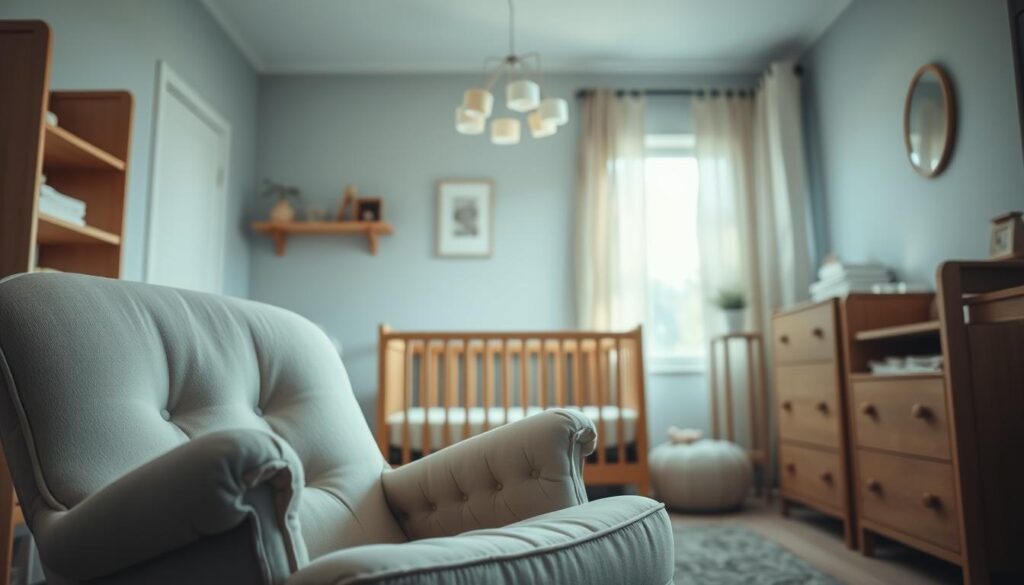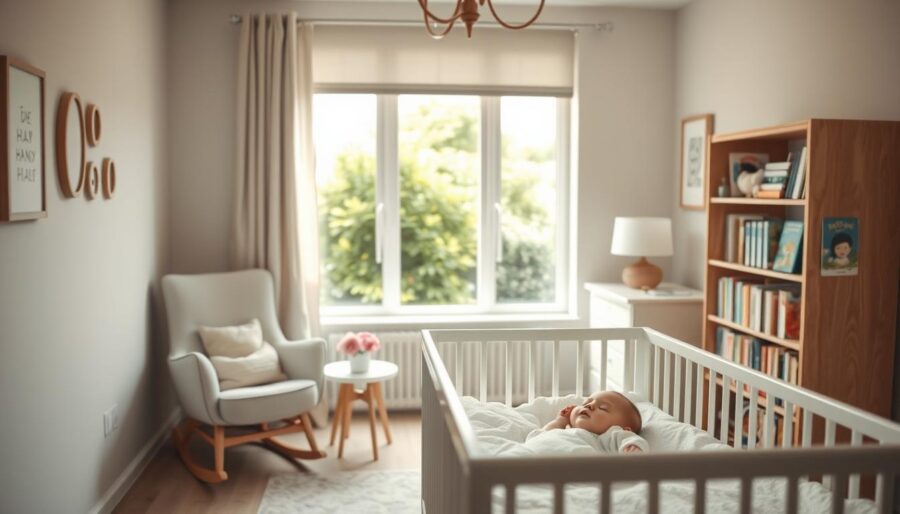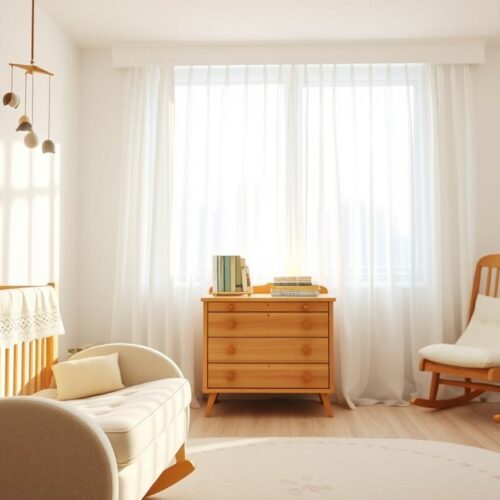Quiet routines play a big part in a baby’s growth by ensuring they have a steady environment. This leads to better sleeping, emotional well-being, and brain development. Establishing these routines makes babies feel like they’re back in the womb, which comforts them. This makes it easier for them to adjust to life outside.
It’s vital to understand the role of quiet routines in promoting good sleep. Good sleep is key for your baby’s development and health. By keeping things calm, you’re helping your baby have a balanced and peaceful life.
The Importance of Quiet Time for Baby Development
Creating a structured environment with quiet time is key for baby growth. It helps babies achieve peaceful sleep. This sleep is vital for their growth. Quiet time sets a rhythm that builds emotional stability, making babies feel secure and calm.
Quiet times let babies unwind and reflect on their day. This supports their emotional health. A consistent schedule of quiet periods aids in developing regular sleep habits. These habits are important for brain growth and overall health.
Keeping things calm prevents babies from getting too overwhelmed. This balance promotes peaceful sleep and emotional well-being. Adding quiet time to your baby’s daily routine helps them grow in many ways.
How Quiet Routines Improve Baby Sleep Patterns
Creating a calm baby routine helps your baby sleep better. Dimming the lights before bed makes a tranquil setting. It shows your baby the difference between night and day. This helps set their internal clock right.
Playing soft white noise is another useful tip. Sounds like gentle rain help block out sudden noises. They help your baby sleep without waking up too much. Adding things like a dream feed helps too. It means less waking up at night for your baby.
These quiet steps do more than just improve sleep. They also make a comforting tranquil setting for your baby. A steady baby routine with these methods helps babies calm themselves. It’s key for good sleep habits.
Creating a Peaceful Living Space for Your Baby
Creating a calm living area is key for your baby’s comfort and peace. A well-planned space can really help your baby sleep better and feel well.
White noise machines work wonders. They produce steady, calming sounds that block out sudden noises. This helps your baby sleep in a quiet space. Soft lights also play a big role; they make a soothing atmosphere that’s perfect for sleep.
Keeping the space tidy matters too. Having clear spaces and organized storage makes the room calm. This helps your baby feel secure and sleep without trouble.
Also, choosing soft, safe materials for the room is important. Comfy fabrics for bedding and soft mattresses make sleeping cozy and safe for your baby.
By paying attention to these details, you can make a sleep space that feels safe for your baby. This leads to them sleeping better and longer.
The Role of Consistent Schedules in Baby’s Growth
Establishing consistent schedules is crucial for your baby’s growth. A regular routine with set feeding times, playtime, and naps helps set their internal clock. It also boosts their overall development.
For example, sticking to a feeding timetable ensures your baby eats when they need to. This is key for their physical health. Also, sleeping at regular times is good for their brain and nerves.
A structured routine also lowers stress for infants. It makes their world more predictable. Feeling secure, babies can then work on big skills like crawling, walking, and talking.
Don’t forget about playtime in their routine. It’s essential for their physical, mental, and social growth. Playing, then resting regularly, creates a balance. This balance is vital for your baby’s whole growth.
To wrap up, consistent schedules create a stable, caring environment. With a regular routine, you’re helping your baby grow well. You’re also setting up healthy habits for their future.
Routine and Quiet Environment: Key to Baby’s Emotional Health
Having a regular routine is vital for your baby’s emotional health. It makes them feel safe and comfortable. This helps lower anxiety and improves their mood.
A quiet environment is also crucial. It lowers stress, helping babies stay calm. This calmness is key for their emotional growth.
Remember, your actions and the environment you create affect your baby’s feelings. Use calm voices, keep nap times consistent, and make sure their surroundings are peaceful. These steps will help ensure your baby is happy and emotionally healthy.

| Aspect | Benefits for Baby Emotional Health |
|---|---|
| Routine | Provides security, reduces anxiety, enhances mood |
| Quiet Environment | Promotes calmness, lowers stress levels, facilitates exploration |
| Serene Surroundings | Boosts overall well-being, supports mental health |
Designing a Structured Daily Routine for Infants
Creating a structured daily routine is vital for an infant’s growth. It includes a balance of feeding, playtime, and sleep following their natural patterns. A rhythm like “eat, play, sleep” makes a day predictable for babies. This is important for their security and happiness.
| Activity | Time | Benefits |
|---|---|---|
| Feeding | 7:00 AM, 11:00 AM, 3:00 PM, 7:00 PM | Ensures nutritional needs are met and promotes growth |
| Playtime | 8:00 AM, 12:00 PM, 4:00 PM | Enhances cognitive and physical development through stimulation |
| Sleeping | 9:00 AM, 1:00 PM, 5:00 PM | Contributes to physical rest and mental growth |
Sticking to a routine for infants offers a stable and familiar setup. It not only meets their basic needs but also keeps their surroundings peaceful. Such an environment supports their emotional and psychological growth positively.
Benefits of a Serene Surroundings for Newborns
A calm environment is key for newborns. It helps avoid too much sensory input. This makes it easier for babies to sleep well and stay stress-free. It also boosts their overall health.
A peaceful setting helps both babies and their parents. Newborns do better in quiet places with fewer interruptions. This lets them rest and grow without stress. Parents also feel more relaxed. This helps them care for their child better.
Keeping babies in a serene place is important. It supports their healthy growth. It gives them a great start in life.
Tips on Setting Up a Calm and Organized Lifestyle
Creating a calm and organized lifestyle for your baby begins with a steady routine. This routine helps build a feeling of safety. Keeping your home tidy and free from clutter also makes for a peaceful living space. Make time each day to arrange toys, clothes, and other essentials to maintain a calm area.
It’s important to have special spots for different activities. For example, create specific places for feeding, playing, and sleeping. This organization teaches the baby what to expect in each space, making things more comfortable and predictable.
Choosing soothing colors and soft lights can make the living space even more peaceful. Light pastel colors and natural light are calming. They help both the baby and caregivers feel less stressed. Adding plants can also make the home feel more peaceful and relaxed.
Keep important items like diapers and baby food within easy reach. This setup helps caregivers quickly meet the baby’s needs without fuss. A well-organized space creates a calm environment for the baby to grow. It also helps caregivers stay relaxed.
How a Comfortable and Quiet Environment Boosts Sleep
Making sure your baby’s sleeping area is comfy and quiet is key to their sleep. It’s like recreating the peace they felt in the womb, which helps them sleep better and longer. This peaceful space doesn’t just improve sleep; it also makes a soothing place that helps your baby feel good all around.
To create such a space, think about tweaking a few things:
- Keep the room at a cozy 68-72°F so your baby stays comfortable all night.
- Pick soft, airy bedding to keep your baby warm and snug.
- Use gentle, calming sounds, like white noise or lullabies, to mimic the womb’s soothing sounds.
A calm and quiet space does more than just help with sleep. It also makes a secure area that helps your baby feel safe and chill. Focus on these aspects to build a special spot that helps with sleep and supports your baby’s growth.
By carefully setting up where your baby sleeps, you create a pattern that naturally improves sleep. This means better nights for you and your baby.
Keeping Your Baby’s Schedule Flexible Yet Structured

Keeping a balance in your baby’s routine is key for their growth. It’s about blending steady habits with the ability to change when needed. This mix helps your baby know what’s coming while adapting to new things.
A routine that’s both steady and adaptable supports your baby’s health and learning. Paying attention to your baby’s signals makes both day and night easier. They feel safe knowing what to expect, but also stay comfy with changes in the schedule.
Here’s a detailed example of how you can establish such a schedule:
| Part of Day | Activity | Notes |
|---|---|---|
| Morning | Wake up, feeding | Consistent wake-up time with minor flexibility. |
| Mid-Morning | Nap | Adjust nap times based on the baby’s signs of tiredness. |
| Lunch | Feeding, playtime | Structured feeding time followed by interactive play. |
| Afternoon | Nap | Monitor the baby’s cues to set nap duration. |
| Evening | Feeding, quiet activities | Regular feeding with calming activities to prepare for bedtime. |
The Impact of Quiet Routines on Parent-Child Relationships
Quiet routines can really improve how you get along with your child. By sticking to calm daily habits, you and your kid will stress less and connect more. Setting up a plan for each day helps everyone know what to expect. This makes parents feel in control and less worried.
This sense of order is good for your relationship. It makes each moment together better.
Routines also make both you and your child feel emotionally better. When kids know what’s coming up, they feel safe and loved. This makes your bond stronger. Plus, having a plan frees up time for fun stuff instead of just dealing with a messy day. Quiet routines create a friendly place for strong bonds to grow.
Balancing Daily Life with Baby’s Needs
Finding harmony between your life and your baby’s needs takes planning and a solid routine. Parents often balance many things. Mixing baby care with daily tasks can lessen stress and bring the family together.
Try syncing your baby’s feedings, sleep, and play with your tasks. Plan feeds around chores or errands for fewer interruptions. A set routine aids both you and baby, giving stability.
Also, carve out times for meal prep, working out, and unwinding. A consistent schedule aids your baby’s growth and helps the whole family.
- 6:00 AM – Morning feed and diaper change
- 7:00 AM – Personal exercise while baby naps
- 8:00 AM – Breakfast and baby playtime
- 10:00 AM – Errands or household chores during baby’s second nap
- 12:00 PM – Lunch and midday feed
- 2:00 PM – Quiet activities like reading or tummy time
- 4:00 PM – Afternoon nap for the baby, personal relaxation time
- 6:00 PM – Dinner prep and evening feed
- 8:00 PM – Bath time and bedtime routine
Integrating these habits makes balancing life smoother and more rewarding. This plan meets your baby’s needs while keeping the day organized for everyone.
Importance of Low-Stimulation Activities for Babies
It’s vital to include calm activities in your baby’s day. Activities like reading soft stories or playing soothing music help. They keep your baby peaceful by avoiding too much excitement, which can upset them.
Low-stimulation activities create a quiet space that’s good for learning and bonding. Gentle play, without bright lights or loud noises, makes your baby feel secure and happy.
Here’s a look at some activities that bring peace and quiet for babies:
| Activity | Stimulus Level | Benefits |
|---|---|---|
| Reading Soft Stories | Low | Enhances language skills and calmness |
| Listening to Soft Music | Low | Promotes relaxation and sleep |
| Quiet Playtime with Soft Toys | Low | Encourages gentle motor skills and imagination |
By doing these peaceful activities every day, your baby stays relaxed. This makes it easy for them to learn and grow in a calm environment.
How Quiet Routines Aid in Baby’s Cognitive Development
Quiet routines are key to helping babies learn and think. These routines create a structure that supports brain growth. By having regular quiet times, babies can focus better and learn more. This approach reduces distractions, letting babies dive deeper into their environment.
Quiet routines bring order and predictability into a baby’s life. This structure is good for managing emotions and boosting important skills like attention and memory. Regular periods without distractions let your baby process information better. This is important for their learning and brain development.
Quiet times also let babies explore on their own. During these times, they play by themselves, which is good for growing independence and solving problems. Focusing on calm, easy activities during these periods helps their brains grow. It also improves their ability to think and learn on their own.
Adding quiet routines to your daily plan is great for your baby’s learning. It also makes a peaceful, caring environment. A steady quiet routine eases transitions between activities. This helps grow their thinking skills and emotional health.
Conclusion
It’s key to know how crucial quiet times are for your baby’s growth. Adding calm routines can make your baby’s sleep better, their feelings stronger, and their mind sharper. These practices make a caring space that gives your baby safety and steadiness.
Quiet times do more than help your baby. They make family life smoother. By keeping a routine, parents can stay on track and less stressed. This means a happier home. As your baby grows in a quiet space, balancing life gets easier, making family time more enjoyable.
It’s not just about your baby’s growth to value quiet times. It’s about making life better for everyone. By making these calm practices a priority, you give your baby a great start. Plus, you build a loving and peaceful home for all.




